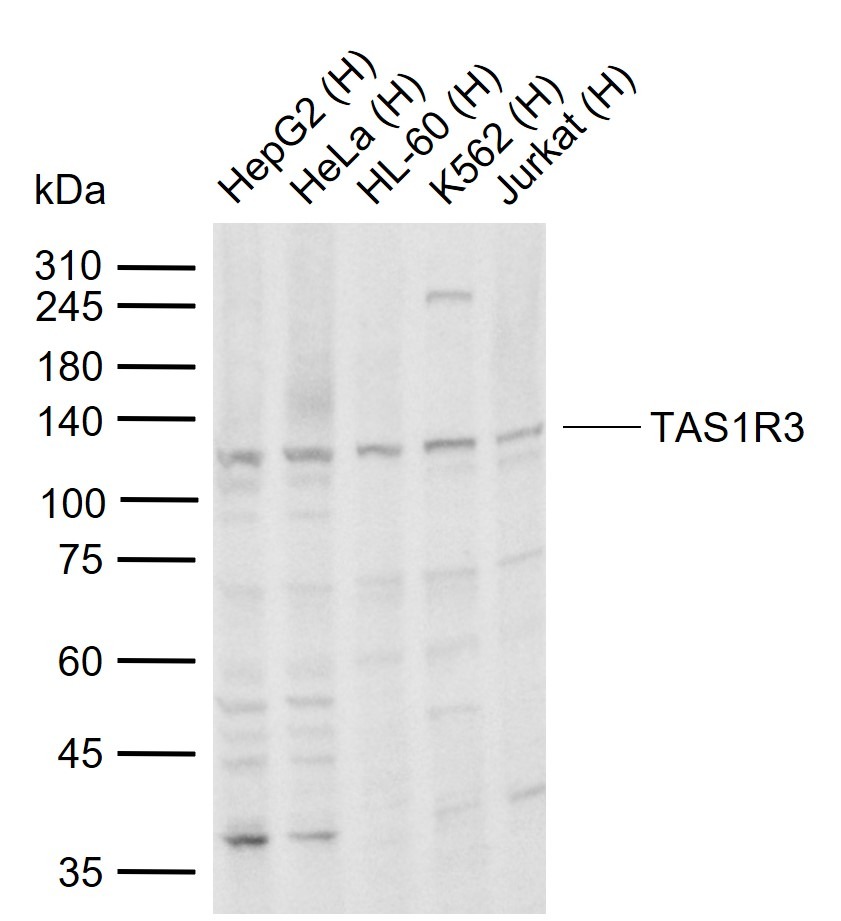Shopping Cart
Remove All Your shopping cart is currently empty
Your shopping cart is currently empty
Anti-TAS1R3 Polyclonal Antibody is a Rabbit antibody targeting TAS1R3. Anti-TAS1R3 Polyclonal Antibody can be used in WB.
| Pack Size | Price | USA Warehouse | Global Warehouse | Quantity |
|---|---|---|---|---|
| 50 μL | $220 | 7-10 days | 7-10 days | |
| 100 μL | $372 | 7-10 days | 7-10 days | |
| 200 μL | $528 | 7-10 days | 7-10 days |
| Description | Anti-TAS1R3 Polyclonal Antibody is a Rabbit antibody targeting TAS1R3. Anti-TAS1R3 Polyclonal Antibody can be used in WB. |
| Synonyms | TR3, Taste receptor type 1 member 3, TAS1R3, T1R3, Sweet taste receptor T1R3 |
| Ig Type | IgG |
| Reactivity | Human (predicted:Mouse) |
| Verified Activity | Sample: Lane 1: Human HepG2 cell lysates Lane 2: Human HeLa cell lysates Lane 3: Human HL-60 cell lysates Lane 4: Human K562 cell lysates Lane 5: Human Jurkat cell lysates Primary: Anti-TAS1R3 (TMAB-01809) at 1/1000 dilution Secondary: IRDye800CW Goat Anti-Rabbit IgG at 1/20000 dilution Predicted band size: 92 kDa Observed band size: 120 kDa  |
| Application | |
| Recommended Dose | WB: 1:500-2000 |
| Antibody Type | Polyclonal |
| Host Species | Rabbit |
| Subcellular Localization | Cell membrane; Multi-pass membrane protein. |
| Tissue Specificity | Expressed in vascular endothelium. |
| Construction | Polyclonal Antibody |
| Purification | Protein A purified |
| Appearance | Liquid |
| Formulation | 0.01M TBS (pH7.4) with 1% BSA, 0.02% Proclin300 and 50% Glycerol. |
| Concentration | 1 mg/mL |
| Research Background | The protein encoded by this gene is a G-protein coupled receptor involved in taste responses. The encoded protein can form a heterodimeric receptor with TAS1R1 to elicit the umami taste response, or it can bind with TAS1R2 to form a receptor for the sweet taste response. [provided by RefSeq, Nov 2015] |
| Immunogen | KLH conjugated synthetic peptide: human TAS1R3 |
| Antigen Species | Human |
| Gene Name | TAS1R3 |
| Gene ID | |
| Protein Name | Taste receptor type 1 member 3 |
| Uniprot ID | |
| Function | Putative taste receptor. TAS1R1/TAS1R3 responds to the umami taste stimulus (the taste of monosodium glutamate). TAS1R2/TAS1R3 recognizes diverse natural and synthetic sweeteners. TAS1R3 is essential for the recognition and response to the disaccharide trehalose (By similarity). Sequence differences within and between species can significantly influence the selectivity and specificity of taste responses. |
| Molecular Weight | Theoretical: 92 kDa. |
| Stability & Storage | Store at -20°C or -80°C for 12 months. Avoid repeated freeze-thaw cycles. |
| Transport | Shipping with blue ice. |
| Size | Quantity | Unit Price | Amount | Operation |
|---|

Copyright © 2015-2026 TargetMol Chemicals Inc. All Rights Reserved.